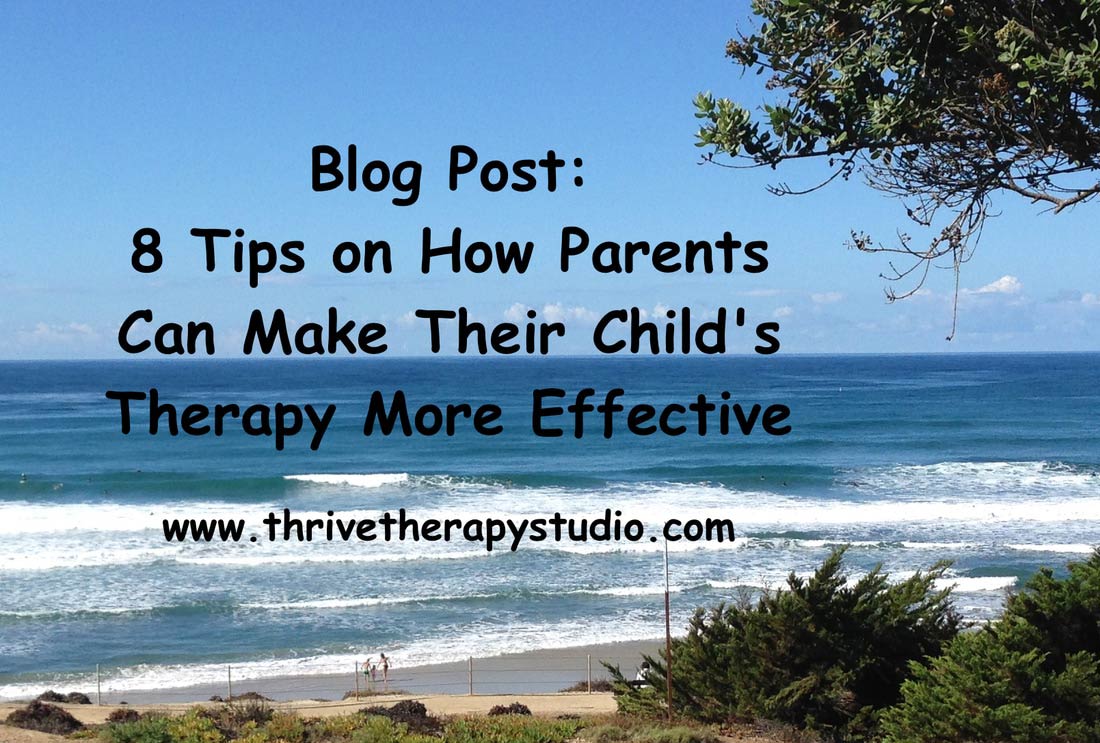8 Tips on How Parents Can Make Their Child’s Therapy More Effective

Parents who call Thrive are often feeling desperately in need of support for their family, their child or teen, and often themselves. While the issues they are calling us about vary, they talk to us about how they just do not know how to help their child or teen through the situation they are experiencing, how their child or teen has changed dramatically, and how they are losing touch with them and sometimes are barely even talking anymore. I can’t emphasize enough how much compassion we at Thrive feel for the parents we work with. We know they are scared, frustrated, and often feeling ineffective as a parent and that is why we always try to focus on supporting the whole family, rather than just the person in therapy with us.
Part of this is inevitably trying to determine how we can best help parents support their child or teen’s therapy or overall development. This blog is dedicated to ways parents can help make therapy more successful, even if they are not coming in to session.
Here are my favorite tips!
- Avoid putting pressure on your child or teen’s therapy to produce immediate results. Often, parents want very specific results of treatment. We get it, you are taking the time to help your child and you want something to change! While that is totally understandable, actually putting that pressure on your child or teen to “change, solve the problem, fix themselves,” you could be undermining our work in therapy. As hard as it can be, please trust the process and talk to the therapist about your concerns and the progress you are hoping to see! We are often completely on the same page and want the same things, but know that we can’t force anyone to change and that change takes time.
- After session, check in with your child gently. I repeat, gently! You can ask them, how was your session today or is there anything you want to talk with me about from today? If your child shares more, that is fantastic! If they clam up, again, trust the process and just let them know you are there to talk if they want to. Please do not pressure them to tell you what they talked about. Their sessions are best left to be theirs and theirs alone.
- Access your own support. This might be through a therapist, talking to friends who have children or teens in therapy, or a support group but just make sure that you are getting the support you need as a parent!
- Convey confidence in your child’s ability to cope and in therapy as a tool to help them cope. Letting them know that you believe that they will be able to get through whatever situation is going on for them and that you are there to help can help your child or teen feel more capable and supported.
- If you are given feedback by your child or teen’s therapist or by your child or teen, please do your best to listen and take in that feedback. As therapists, our role is often to help our child and teen clients advocate for themselves and you can best support this by trying not to be defensive. Know that we as therapists are certainly not judging the parents we work with, simply trying to help families cope more effectively and understand each other more.
- If your child is given coping strategies, tools, tips to try to use at home to help them cope, do what you can to help facilitate their use of those skills in a gentle, non-demanding way. It can also help to model some of what your child or teen is learning. For example, if they are working on expressing anger more appropriately, make sure to also pay attention to how you are expressing anger!
- Show support and a hopeful attitude towards therapy and the information given to your child. If someone is criticizing or judging them for being in therapy, make sure to defend them and acknowledge that all of us can use support for our challenges from time to time.
- Avoid focusing too much on the challenges that are bringing your child or teen to therapy. Make sure to note the successes they are experiencing and the growth they are hopefully showing, rather than focusing more on the areas that still need work.
I hope these are helpful suggestions for you! It is easy as parents to devalue your role in your child or teen’s treatment but your role is crucial to the success of their therapy!
If you would like to talk with a Thrive Therapist about yourself, your child, or teen attending therapy, please reach out to us by phone at (858) 342-1304.
As always, thanks for reading and comments are always welcome regarding any issues around child or teen psychotherapy services in San Diego by Thrive Therapy Studio.
To stay in the loop on the services offered and to receive updated information about Thrive, please feel free to sign up for the newsletter through the following link: http://eepurl.com/cvGx5n.
Reach out to start
your healing journey

